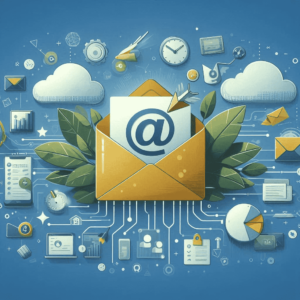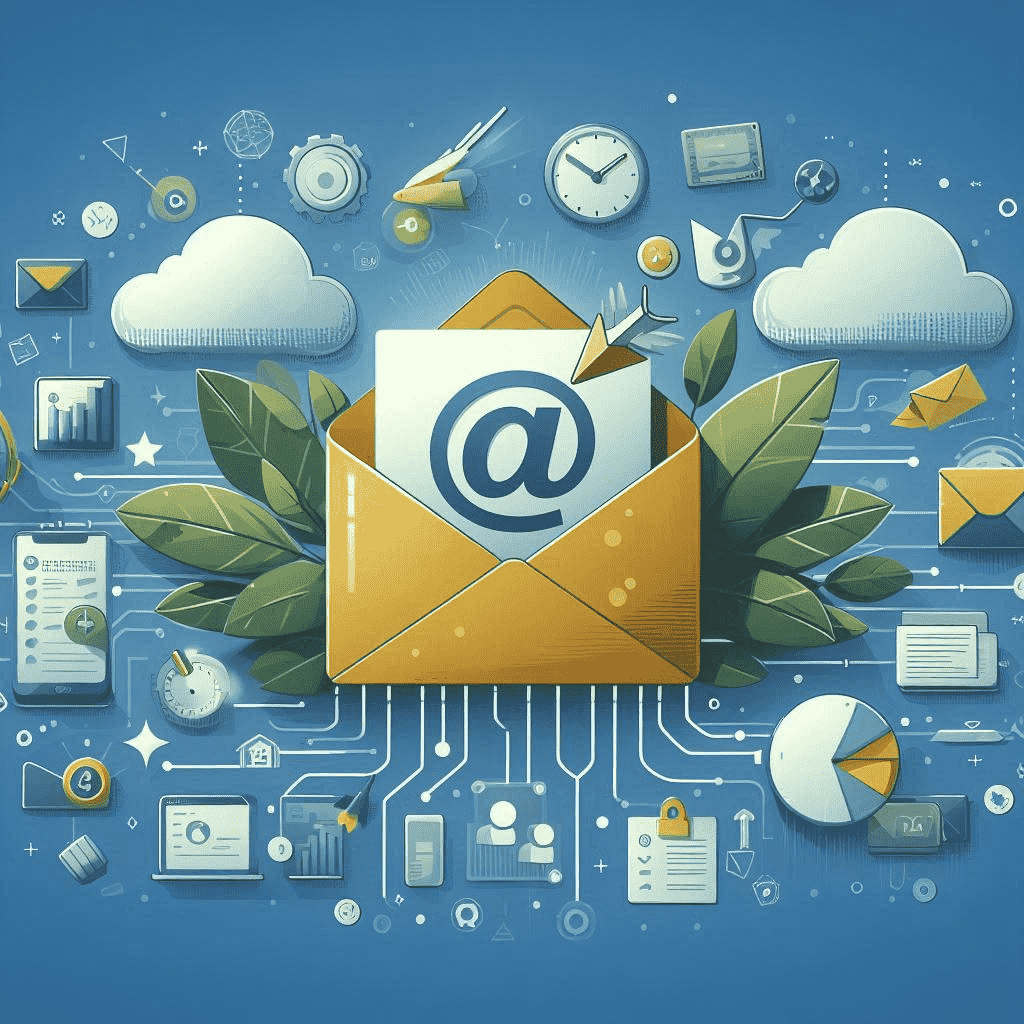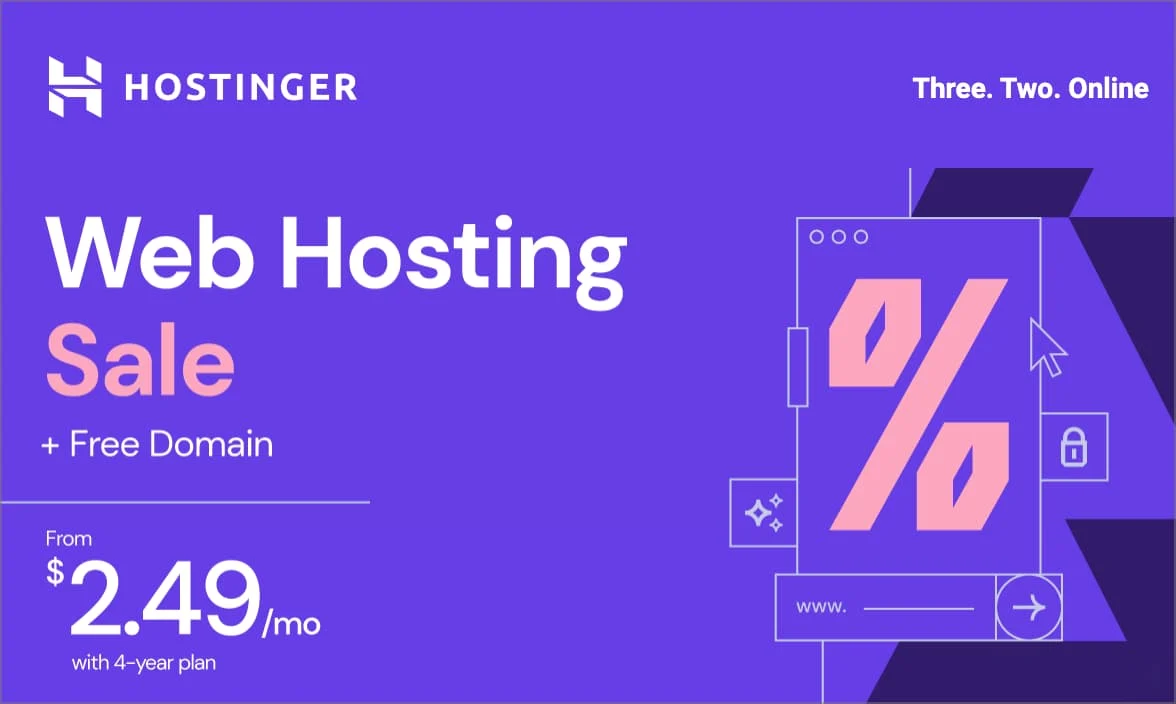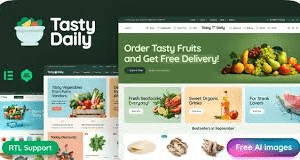
Top 5 Best Email Providers for Businesses in 2024
Top 5 Best Email Providers
Introduction
Choosing the right email provider is crucial for business success. It can enhance communication, improve productivity, and ensure data security.

In this article, we will explore the top 5 email providers for businesses in 2024. These providers offer robust features, security, and reliability, making them the Top 5 Best Email Providers for businesses in 2024.
Top 5 Email Providers for Businesses in 2024
- Google Workspace Google Workspace is a comprehensive business email solution that integrates seamlessly with other Google services. It offers a user-friendly interface, strong security features, and excellent collaboration tools. This makes it one of the best email providers for businesses in 2024.
- Microsoft Outlook Microsoft Outlook is a well-established business email solution known for its powerful features and integration with Microsoft Office. It provides advanced security options, a customizable interface, and robust calendar and task management tools.
- Zoho Mail Zoho Mail is an affordable and flexible business email solution. It offers a clean, ad-free interface, strong security features, and integration with other Zoho applications. This makes it a top choice for small to medium-sized businesses.
- Proton Mail Proton Mail is renowned for its privacy and security features. It offers end-to-end encryption, ensuring that your business communications remain confidential. This makes it one of the best email providers for businesses in 2024, especially for those prioritizing .
- Bluehost Bluehost provides a reliable and affordable business email solution. It offers a free domain name, SSL certificate, and easy integration with other web hosting services. This makes it a great choice for businesses looking for a comprehensive email and hosting solution.
Choosing the best email providers for businesses in 2024 can significantly impact your business’s efficiency and security. Each of these providers offers unique features tailored to different business needs, ensuring you find the perfect fit for your organization.
Table of Contents
Criteria for Choosing an Email Provider
Security Features
Email security is paramount for any business. A robust email provider should offer advanced email security measures such as end-to-end encryption, spam filtering, and phishing protection. These features ensure that sensitive business information remains confidential and protected from cyber threats.
Storage Capacity
Adequate email storage is essential for managing large volumes of emails and attachments. Look for providers that offer generous email storage limits and scalable options to accommodate your business’s growth. This ensures that you won’t run out of space and can keep all important communications accessible.
Integration with Other Tools
Tool integration is crucial for enhancing productivity and streamlining workflows. Choose an email provider that seamlessly integrates with other business tools such as calendars, project management software, and CRM systems. Effective tool integration can save time and improve overall efficiency by allowing smooth data flow between applications.
By focusing on email security, email storage, and tool integration, you can select an email provider that meets your business’s needs and supports its growth. Each of these criteria plays a vital role in ensuring a reliable and efficient email solution.
Google Workspace
Google Workspace is a comprehensive suite of productivity and collaboration tools designed for businesses. It includes business email, cloud storage, document creation, and video conferencing, all integrated seamlessly to enhance efficiency and communication within organizations.
Key Features
Here are the key features of Google Workspace:
| Feature | Description |
|---|---|
| Custom Business Email | Professional email addresses with your domain (e.g., [email protected]). |
| Google Drive | Cloud storage with generous space for files and documents. |
| Google Meet | High-quality video conferencing for remote meetings. |
| Google Docs, Sheets, Slides | Real-time collaboration on documents, spreadsheets, and presentations. |
| Security and Management | Advanced security features including two-factor authentication and admin controls. |
Pricing Plans
Google Workspace offers several pricing plans to suit different business needs:
| Plan | Price per User/Month | Storage | Key Features |
|---|---|---|---|
| Business Starter | $6 | 30 GB pooled storage | Custom business email, 100 participant video meetings, standard support. |
| Business Standard | $12 | 2 TB pooled storage | Custom business email, 150 participant video meetings, recording, noise cancellation. |
| Business Plus | $18 | 5 TB pooled storage | Custom business email, 500 participant video meetings, enhanced security features. |
| Enterprise | Custom pricing | 5 TB+ pooled storage | Custom business email, 1000 participant video meetings, advanced security and compliance controls. |
Pros and Cons
Here are the pros and cons of Google Workspace:
| Pros | Cons |
|---|---|
| 👍 Seamless integration with Google services | 👎 Higher cost for advanced plans |
| 👍 User-friendly interface | 👎 Limited storage in lower-tier plans |
| 👍 Strong security features | 👎 Learning curve for new users |
| 👍 Excellent collaboration tools | 👎 Dependence on internet connectivity |
Google Workspace is a powerful business email solution that offers a range of features to enhance productivity and security. Its integration with other Google tools makes it a versatile choice for businesses of all sizes.
Microsoft 365
Microsoft 365 is a comprehensive suite of productivity tools designed to enhance collaboration, communication, and efficiency. It includes popular applications like Word, Excel, PowerPoint, and Outlook, along with cloud services such as OneDrive and Teams. As a leading email provider, Microsoft 365 offers robust security features and seamless integration across devices, making it a preferred choice for both individuals and businesses.
Key Features
| Feature | Description |
|---|---|
| Word | Advanced word processing with real-time collaboration. |
| Excel | Powerful spreadsheet tool with data analysis and visualization capabilities. |
| PowerPoint | Create engaging presentations with multimedia support. |
| Outlook | Integrated email provider with calendar and task management. |
| Teams | Collaboration platform for chat, meetings, and file sharing. |
| OneDrive | 1 TB of cloud storage for secure file access and sharing. |
| SharePoint | Enterprise content management and collaboration platform. |
| Microsoft Defender | Advanced security features to protect against cyber threats. |
Pricing Plans
| Plan | Price (Yearly) | Price (Monthly) | Features |
|---|---|---|---|
| Microsoft 365 Family | $99.99 | $9.99 | For up to 6 people, 6 TB cloud storage, premium apps, ad-free email. |
| Microsoft 365 Personal | $69.99 | $6.99 | For 1 person, 1 TB cloud storage, premium apps, ad-free email. |
| Office Home & Student 2021 | $149.99 | N/A | One-time purchase, classic apps, no cloud storage or premium features. |
Pros and Cons
| Pros | Cons |
|---|---|
| 😊 Comprehensive Suite: Includes all essential productivity tools. | 😞 Subscription Cost: Ongoing subscription fees can add up. |
| 😊 Cloud Integration: Access files from anywhere with OneDrive. | 😞 Complexity: Can be overwhelming for new users. |
| 😊 Regular Updates: Always have the latest features and security. | 😞 Performance: May lag on low-end devices. |
| 😊 Collaboration: Excellent tools for team collaboration. | 😞 Learning Curve: Requires time to learn all features. |
Microsoft 365 stands out as a versatile and powerful suite, ideal for both personal and professional use. Its integration as an email provider and the extensive range of applications make it a top choice for enhancing productivity.
Zoho Mail
Zoho Mail is a secure and reliable email hosting service tailored for businesses. It offers a range of features designed to enhance productivity and streamline communication. As one of the leading business email solutions, Zoho Mail provides robust security, seamless integration with other Zoho apps, and a user-friendly interface. This makes it an ideal choice for companies looking for efficient and professional email solutions.

Key Features
| Feature | Description |
|---|---|
| Email Suite | Comprehensive email management with Calendar, Tasks, Notes, and Contacts. |
| Migration Tools | Easy migration from other email providers using IMAP or POP protocols. |
| Streams | Social media-style collaboration within the email platform. |
| Control Panel | Extensive control panel for managing users and settings. |
| Custom Domains | Use your own domain for professional email addresses. |
| Integrations | Seamless integration with Zoho apps and third-party applications. |
| Security Features | End-to-end encryption, two-factor authentication, and anti-phishing tools. |
| Mobile Access | Fully optimized for mobile devices with dedicated apps. |
Pricing Plans
| Plan | Price (Monthly) | Price (Yearly) | Features |
|---|---|---|---|
| Free Plan | $0 | $0 | Up to 5 users, 5GB/user, 25MB attachment limit. |
| Mail Lite | $1/user | $12/user | 5GB storage per user, email hosting for multiple domains. |
| Mail Premium | $4/user | $48/user | 50GB storage per user, archiving, eDiscovery, and S-MIME. |
| Workplace | $3/user | $36/user | Includes business email and online office apps. |
Pros and Cons
| Pros | Cons |
|---|---|
| 😊 Affordable: Competitive pricing for small and medium businesses. | 😞 Interface: Can be confusing for new users. |
| 😊 Security: Robust security features to protect business data. | 😞 Integration: Best suited for Zoho ecosystem, limited outside. |
| 😊 Custom Domains: Professional email addresses with custom domains. | 😞 Storage: Limited storage on lower-tier plans. |
| 😊 Collaboration: Streams feature enhances team collaboration. | 😞 Learning Curve: Requires time to master all features. |
Zoho Mail stands out as a versatile and secure business email solution, offering a range of features that cater to the needs of modern businesses. Its affordability and robust security make it a strong contender in the realm of business email solutions.
ProtonMail

ProtonMail is a highly secure email service designed to protect user privacy. Based in Switzerland, it offers end-to-end encryption, ensuring that only the sender and recipient can read the emails. ProtonMail is ideal for individuals and businesses seeking secure email solutions that prioritize data protection and privacy.
Key Features
| Feature | Description |
|---|---|
| End-to-End Encryption | Ensures that only the sender and recipient can read the emails. |
| Zero-Access Encryption | Even ProtonMail cannot access your emails. |
| Custom Domains | Use your own domain for professional email addresses. |
| Self-Destructing Emails | Emails can be set to delete automatically after a specified time. |
| Two-Factor Authentication | Adds an extra layer of security to your account. |
| Open Source | The code is publicly available for transparency and security audits. |
| PhishGuard | Blocks known phishing attempts and suspicious emails. |
| Mobile Apps | Fully optimized apps for iOS and Android devices. |
Pricing Plans
| Plan | Price (Monthly) | Price (Yearly) | Features |
|---|---|---|---|
| Free Plan | $0 | $0 | 1 email address, 1 GB storage, limited features. |
| Mail Plus | $5/month | $47.88/year | 5 GB storage, 5 email addresses, custom domains, priority support. |
| Professional | $8/user/month | $75.84/user/year | 5 GB storage per user, multi-user support, custom domains, priority support. |
| Visionary | $30/month | $288/year | 20 GB storage, 50 email addresses, all features included. |
Pros and Cons
| Pros | Cons |
|---|---|
| 😊 High Security: End-to-end encryption ensures privacy. | 😞 Cost: Premium plans can be expensive. |
| 😊 Privacy Laws: Based in Switzerland with strong privacy laws. | 😞 Storage: Limited storage on free and lower-tier plans. |
| 😊 User-Friendly: Intuitive interface and easy to use. | 😞 Verification: May require personal information for account setup. |
| 😊 Custom Domains: Professional email addresses with custom domains. | 😞 Subject Lines: Email subject lines are not encrypted. |
ProtonMail stands out as a top choice for secure email solutions, offering robust encryption and privacy features. Its commitment to user privacy and security makes it a preferred option for those seeking a secure email service.
Bluehost Email Hosting Overview
Bluehost offers professional email services that enhance your brand’s credibility. These services are designed to provide secure and reliable communication for businesses and individuals. Let’s explore the key features, pricing plans, and pros and cons.
Key Features
| Feature | Description |
|---|---|
| Professional Email | – Boosts credibility with a custom email address matching your domain. – Includes an easy-to-use inbox, integrated calendar, address book, and task management. – Provides virus, spam, and phishing security. |
| Google Workspace | – Collaborate with Google Workspace, which includes Gmail, Google Chat & Meet, and productivity tools like Docs, Sheets, and Slides. – Offers Google Drive Cloud storage. |
Pricing Plans
| Plan | Features | Price (Monthly) |
|---|---|---|
| Professional Email | – Matching domain email – Integrated tools – Up to 80GB Drive Cloud storage | Starting at $3.95 |
| Google Workspace | – Gmail, Chat & Meet – Productivity tools – Google Drive Cloud storage | Starting at $6.95 |
Pros and Cons
| Pros | Cons |
|---|---|
| ✅ Reliable and secure email hosting | ❌ Pricing may be steep for smaller businesses |
| ✅ Feature-rich platform | |
| ✅ Good customer support |
Remember, having a professional email address reinforces your brand and builds trust with customers. Bluehost’s email services offer robust security and user-friendly management. 😊
For more details, you can visit Bluehost’s email services page.
Comparison Table

Feature Comparison
Here’s a detailed email provider comparison focusing on key features:
| Feature | Gmail | Outlook | ProtonMail | Zoho Mail |
|---|---|---|---|---|
| Storage | 15 GB (free), more available | 15 GB (free), more available | 500 MB (free), more available | 5 GB (free), more available |
| Security | 2FA, spam protection | 2FA, spam protection | End-to-end encryption | 2FA, spam protection |
| Integration | Google Workspace | Microsoft 365 | Limited | Zoho Suite |
| Offline Access | Yes | Yes | No | Yes |
| Custom Domains | Yes (paid) | Yes (paid) | Yes (paid) | Yes (free) |
| Email Hosting | Yes | Yes | Yes | Yes |
Pricing Comparison
| Plan Name | Gmail | Outlook | ProtonMail | Zoho Mail |
|---|---|---|---|---|
| Free Plan | $0 | $0 | $0 | $0 |
| Basic Plan | $6/user/month | $6/user/month | €5/month | $1/user/month |
| Standard Plan | $12/user/month | $12/user/month | €10/month | $4/user/month |
| Premium Plan | $18/user/month | $20/user/month | €30/month | $7/user/month |
Pros and Cons
| Provider | Pros | Cons |
|---|---|---|
| Gmail | ✅ Easy integration with Google services | ❌ Limited storage on free plan |
| Outlook | ✅ Excellent integration with Microsoft 365 | ❌ Higher cost for premium features |
| ProtonMail | ✅ Top-notch security and privacy | ❌ Limited storage on free plan |
| Zoho Mail | ✅ Affordable pricing | ❌ Interface can be complex |
This email provider comparison should help you choose the best service for your needs.
Importance of Security
Email security is crucial in today’s digital age. With over 333 billion emails sent daily, email remains a primary communication tool for both personal and professional use. However, this popularity makes it a prime target for cybercriminals. Effective email security helps protect sensitive information, maintain privacy, and prevent unauthorized access, ensuring the integrity and confidentiality of communications.
Common Security Features
| Feature | Description |
|---|---|
| Two-Factor Authentication (2FA) | Adds an extra layer of security by requiring a second form of verification. |
| Spam Filtering | Blocks unwanted and potentially harmful emails from reaching the inbox. |
| Encryption | Protects the contents of emails from being read by unauthorized persons. |
| Phishing Protection | Detects and blocks phishing attempts to steal sensitive information. |
| Malware Scanning | Scans email attachments for malicious software. |
| Domain Spoofing Protection | Prevents attackers from sending emails that appear to come from legitimate domains. |
Pricing Comparison
Here’s a pricing comparison for popular email security solutions:
| Provider | Basic Plan (per month) | Standard Plan (per month) | Premium Plan (per month) |
|---|---|---|---|
| Gmail | $0 | $6/user | $18/user |
| Outlook | $0 | $6/user | $20/user |
| ProtonMail | €5 | €10 | €30 |
| Zoho Mail | $1/user | $4/user | $7/user |
Pros and Cons
Here’s a pros and cons table for email security features:
| Feature | Pros | Cons |
|---|---|---|
| Two-Factor Authentication (2FA) | ✅ Enhanced security | ❌ Can be inconvenient for users |
| Spam Filtering | ✅ Reduces clutter and threats | ❌ May occasionally block legitimate emails |
| Encryption | ✅ Protects sensitive data | ❌ Can be complex to implement |
| Phishing Protection | ✅ Prevents data breaches | ❌ Not always 100% effective |
| Malware Scanning | ✅ Detects and removes threats | ❌ Can slow down email processing |
| Domain Spoofing Protection | ✅ Ensures email authenticity | ❌ Requires proper configuration |
Understanding the importance of email security and the common features available can help you choose the best solution to protect your communications.
CRM Integration
Business tool integration is essential for streamlining operations and enhancing productivity. Integrating Customer Relationship Management (CRM) systems with other business tools can significantly improve efficiency and data accuracy. CRM integration allows for seamless data flow between sales, marketing, and customer service departments, ensuring that all teams have access to up-to-date information.
Key Features of CRM Integration
| Feature | Description |
|---|---|
| Unified Data | Centralizes customer data from various sources into one platform. |
| Automated Workflows | Automates repetitive tasks, saving time and reducing errors. |
| Enhanced Reporting | Provides comprehensive insights and analytics on customer interactions. |
| Improved Communication | Facilitates better communication between departments. |
| Scalability | Easily scales with business growth. |
Pricing Comparison for CRM Integration Tools
| Provider | Basic Plan (per month) | Standard Plan (per month) | Premium Plan (per month) |
|---|---|---|---|
| Salesforce | $25/user | $75/user | $150/user |
| HubSpot | $50/user | $80/user | $120/user |
| Zoho CRM | $12/user | $20/user | $35/user |
| Pipedrive | $15/user | $29/user | $59/user |
Pros and Cons of CRM Integration
| Pros | Cons |
|---|---|
| ✅ Centralized Data Management | ❌ High Initial Setup Costs |
| ✅ Increased Efficiency | ❌ Complexity in Integration |
| ✅ Better Customer Insights | ❌ Ongoing Maintenance Required |
| ✅ Automated Processes | ❌ Potential Data Security Risks |
Project Management Tools
Integrating project management tools with other business applications is another crucial aspect of business tool integration. This integration helps in tracking project progress, managing resources, and ensuring timely completion of tasks.
Key Features of Project Management Tool Integration
| Feature | Description |
|---|---|
| Task Management | Assigns and tracks tasks across teams. |
| Resource Allocation | Manages resources efficiently to avoid bottlenecks. |
| Time Tracking | Monitors time spent on tasks and projects. |
| Collaboration Tools | Facilitates team communication and collaboration. |
| Reporting and Analytics | Provides insights into project performance and progress. |
Pricing Comparison for Project Management Tools
| Provider | Basic Plan (per month) | Standard Plan (per month) | Premium Plan (per month) |
|---|---|---|---|
| Asana | $10.99/user | $24.99/user | Custom Pricing |
| Trello | $5/user | $10/user | $17.50/user |
| Monday.com | $8/user | $10/user | $16/user |
| ClickUp | $5/user | $12/user | $19/user |
Pros and Cons of Project Management Tool Integration
| Pros | Cons |
|---|---|
| ✅ Enhanced Collaboration | ❌ Learning Curve for New Users |
| ✅ Better Resource Management | ❌ Integration Complexity |
| ✅ Improved Task Tracking | ❌ Subscription Costs |
| ✅ Comprehensive Reporting | ❌ Potential Over-Reliance on Tools |
Integrating CRM and project management tools with other business applications can greatly enhance operational efficiency and productivity.
Customer Support
Availability
Customer support availability is crucial for ensuring that customers can get help whenever they need it. High availability means that support services are accessible 24/7, which is especially important for businesses with a global customer base. Offering multiple channels for support, such as phone, email, live chat, and social media, ensures that customers can reach out through their preferred method.
Key Features of Customer Support Availability
| Feature | Description |
|---|---|
| 24/7 Support | Round-the-clock assistance to handle customer queries at any time. |
| Multi-Channel Support | Availability through phone, email, live chat, and social media. |
| Self-Service Options | FAQs, knowledge bases, and automated chatbots for instant help. |
| Fast Response Times | Quick turnaround for resolving customer issues. |
| Global Coverage | Support available across different time zones. |
Pricing Comparison for Customer Support Services
| Provider | Basic Plan (per month) | Standard Plan (per month) | Premium Plan (per month) |
|---|---|---|---|
| Zendesk | $19/agent | $49/agent | $99/agent |
| Freshdesk | $15/agent | $35/agent | $79/agent |
| Intercom | $39/seat | $79/seat | Custom Pricing |
| HubSpot | $45/user | $80/user | $120/user |
Pros and Cons of Customer Support Availability
| Pros | Cons |
|---|---|
| ✅ 24/7 Availability | ❌ Higher Costs for Premium Plans |
| ✅ Multiple Support Channels | ❌ Complexity in Managing Multiple Channels |
| ✅ Self-Service Options | ❌ Limited Personal Interaction |
| ✅ Fast Response Times | ❌ Potential Over-Reliance on Automation |
Quality of Support
The quality of customer support is a key determinant of customer satisfaction and loyalty. High-quality support involves not only resolving issues efficiently but also providing a positive and empathetic customer experience. Quality assurance processes help maintain high standards by regularly evaluating support interactions and providing feedback for improvement.
Key Features of Quality Customer Support
| Feature | Description |
|---|---|
| Empathy and Understanding | Support agents show genuine concern for customer issues. |
| Knowledgeable Staff | Well-trained agents who can provide accurate and helpful solutions. |
| Consistent Quality | Standardized procedures to ensure uniform service quality. |
| Feedback Mechanisms | Regular collection of customer feedback to improve services. |
| Proactive Support | Anticipating and addressing issues before they escalate. |
Pricing Comparison for Quality Assurance Tools
| Provider | Basic Plan (per month) | Standard Plan (per month) | Premium Plan (per month) |
|---|---|---|---|
| Klaus | $12/agent | $25/agent | Custom Pricing |
| Zendesk | $19/agent | $49/agent | $99/agent |
| Freshdesk | $15/agent | $35/agent | $79/agent |
| Intercom | $39/seat | $79/seat | Custom Pricing |
Pros and Cons of Quality Customer Support
| Pros | Cons |
|---|---|
| ✅ High Customer Satisfaction | ❌ Higher Training Costs |
| ✅ Improved Customer Loyalty | ❌ Time-Consuming Quality Assurance Processes |
| ✅ Positive Brand Reputation | ❌ Potential for Human Error |
| ✅ Proactive Issue Resolution | ❌ Resource Intensive |
Ensuring high availability and quality in customer support can significantly enhance customer satisfaction and loyalty.
Scalability
12.1: Small Business Needs
Scalability is crucial for small businesses aiming to grow without proportionally increasing costs. Small businesses need solutions that can adapt to their growth, ensuring they can handle increased demand without compromising quality or efficiency.
Key Features for Small Businesses:
| Feature | Description |
|---|---|
| Cloud-Based Solutions | Easily scalable with minimal upfront costs. |
| Modular ERP Systems | Start with core components and expand as needed. |
| Automated Processes | Reduce manual work and improve efficiency. |
| Customer Relationship Management (CRM) | Manage growing customer base effectively. |
| Data Analytics | Gain insights to drive growth strategies. |
Pricing Table for Small Businesses:
| Solution | Price Range (Monthly) | Description |
|---|---|---|
| Basic ERP System | $50 – $200 | Core functionalities for small businesses. |
| Advanced ERP System | $200 – $500 | Includes additional modules and features. |
| CRM Software | $20 – $150 | Manage customer interactions and data. |
| Data Analytics Tools | $30 – $200 | Tools for analyzing business data and generating reports. |
Pros and Cons for Small Businesses:
| Pros 😊 | Cons 😞 |
|---|---|
| Cost-Effective | Initial setup can be time-consuming. |
| Flexibility | May require training for staff. |
| Improved Efficiency | Dependence on internet connectivity for cloud-based solutions. |
| Scalable | Potential for hidden costs in advanced features. |
| Better Customer Management | Data security concerns with cloud storage. |
12.2: Large Enterprise Solutions
For large enterprises, scalability means handling vast amounts of data and transactions efficiently. Solutions must support extensive operations and integrate seamlessly with existing systems.
Key Features for Large Enterprises:
| Feature | Description |
|---|---|
| High-Performance Computing | Handle large volumes of data and transactions. |
| Advanced ERP Systems | Comprehensive modules for various business functions. |
| Customizable Solutions | Tailored to specific enterprise needs. |
| Robust Security | Protect sensitive data and ensure compliance. |
| Integration Capabilities | Seamlessly integrate with existing systems and software. |
Pricing Table for Large Enterprises:
| Solution | Price Range (Monthly) | Description |
|---|---|---|
| Enterprise ERP System | $500 – $2000 | Full suite of ERP functionalities for large enterprises. |
| Custom Solutions | $2000+ | Tailored solutions based on specific enterprise requirements. |
| Advanced Security Tools | $100 – $500 | Tools for ensuring data security and compliance. |
| Integration Services | $500 – $1500 | Services for integrating new solutions with existing systems. |
Pros and Cons for Large Enterprises:
| Pros 😊 | Cons 😞 |
|---|---|
| High Efficiency | High initial investment. |
| Customizable | Complexity in implementation. |
| Robust Security | Requires ongoing maintenance and updates. |
| Seamless Integration | Potential for integration issues with legacy systems. |
| Scalable | Longer time to fully implement and train staff. |
Scalability is essential for both small businesses and large enterprises, ensuring they can grow and adapt to changing demands efficiently. By choosing the right solutions, businesses can achieve sustainable growth and maintain a competitive edge.
I need Services with …
- Wordpress Service
- Shopify Service
- Youtube Service
- Cv and resume Service
- Linkedin Service
Latest Post
-
Top Daily Taste WordPress Theme: Best Choice for Your Site
$ 15Original price was: $ 15.$ 13Current price is: $ 13. Add to cartAdd to WishlistAdd to Wishlist -

Get Hostinger’s Low-Cost Hosting Now!
Don’t miss out on affordable hosting with Hostinger – click now to bring your website online at an unbeatable price!










